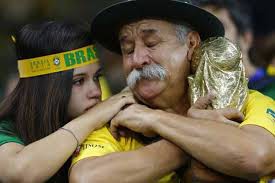World Cup drinks sales to top £1bn but dry up as tournament reaches its end
As we enter the final stage of the World Cup it seems the great British public is ready to put down its pint glass as well as turn off the football on television.
 Shattered dreamsIt is not just Brazil that is feeling flat as the World Cup comes to a close. Beers, wines and spirits sales are slowing down too…but will stop £1bn for the tournament, according to IRI research from the Wilson Drinks Report
Shattered dreamsIt is not just Brazil that is feeling flat as the World Cup comes to a close. Beers, wines and spirits sales are slowing down too…but will stop £1bn for the tournament, according to IRI research from the Wilson Drinks Report
As we enter the final stage of the World Cup it seems the great British public is ready to put down its pint glass as well as turn off the football on television.
Sales data for the fourth week of the World Cup, released today by the Wilson Drinks Report and IRI, reveals that Champagne and sparkling wine were the only drinks categories to show year-on-year growth.
Beers and lagers that had performed so well during the previous weeks of the World Cup have declined sharply in the knockout stages of the World Cup.
But the World Cup overall has been a great boost to the BWS category with total sales over the four weeks of the World Cup reaching £903.2 million, a net increase of £40.5 million. It is likely to top £1 billion for the full five weeks of the World Cup.
Sales data for the week up to July 5 compared to last year shows:
- Champagne and sparkling wines value sales were up 8.7%, and unit volumes up by 2.7% in the last week compared to last year.
- Total value sales for beer, wines and spirits in week 4 were down by £14.6 million compared to the same week in 2013, a decline of 6.3% year-on-year.
- Total value sales were down £37.2 million when compared to week 1 of the World Cup.
- Cider unit volumes were down 11.1% and value sales down 16.2%, for week ending July 5 2014, but were still 5.3% up compared to the four weeks immediately prior to the World Cup.
- Ale and stout achieved reasonable unit volume growth of 6.9%, but value sales dropped by 3.4%.
- Lager value sales fell back 12.0%, and unit volumes were down 5.5%.
- Still wine, which has not enjoyed a strong World Cup, saw weekly sales almost unchanged between £74 million and £79 million per week.
Tim Wilson, managing director of WDR, said: "The latest IRI data shows that the World Cup party is over, as the beer, wines and spirits category has been hit by a double whammy.
"Not only has the World Cup effect dramatically worn off, as watching 11 men in England shirts has become but a distant memory; we are also seeing year-on-year comparisons to the very strong sales in early July 2013, driven by glorious weather.
"Cider in particular tends to be more sensitive to changes in weather patterns, and had a particularly strong week in 2013. Ale and stout managed to achieve decent unit volume growth, but still at the expense of margin.
"However, we are on track to record total alcohol sales well in excess of £1.1 billion for the five weeks of the World Cup, and we still expect total sales to be ahead of the same period last year, even though 2013 had the benefit of Murray's win at Wimbledon."
Wilson added: "Having been the weakest category so far during the World Cup, the performance of still wine doesn't look quite so bad, with weekly sales almost unchanged between £74 million and £79 million per week."
Tim Eales, director of strategic insight at IRI, added: "If sales had continued at the same rate as in the first week, we could have seen a massive additional boost for the grocery industry of £130 million.
"More reasonably, if sales had decayed gradually from the first week's peak, which probably would have required England to reach at least the quarter final stage, the estimated loss of potential sales is £75 million so far."




